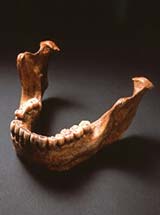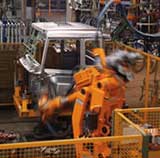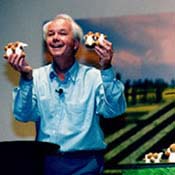
Researchers from the University of Amsterdam have demonstrated that the climate in South Mexico changed following the collapse of the Maya empire. From preserved pollen grains the paleoecologists could deduce that the climate quickly became dryer.
The climate becoming dryer, explains the decrease in the population following the collapse of the Maya empire. The climate researchers have therefore helped to solve an archaeological mystery.
With the help of pollen grains, the paleoecologis

Some of the world’s leading scientists are rubbing shoulders with experts at the University of Abertay Dundee to study tiny plant-like organisms that could unlock billion dollar industries for Europe.
Representatives from famous European universities and research centres, including the renowned Pasteur Institute in Paris and the Czech Academy of Sciences, are putting algae under the microscope in a project considered so important by the EU that it has been given a 1.75m Euro grant (around £1

Shared names prompt good deeds.
When seeking help from a stranger, ask someone who shares your name: people are more likely to assist a namesake, an e-mail study has revealed 1 .
A shared name indicates two people are likely to share genes, so evolution may have taught us to be nice to our namesakes, suggests psychologist Margo Wilson who carried out the study at McMaster University in Hamilton, Ontario, Canada.
Unusual names are particularly good a

CORDIS, the European Commission`s Research and Development Information Service, is offering a new online service dedicated to science and technology foresight and the future of European research. The service is part of the re-launch of a redesigned and upgraded CORDIS `Research beyond 2002` site to reflect the latest developments on both the European research area (ERA) and the Sixth Framework programme (FP6).
Technology Foresight
The new service provides information on res

Dental diary of a teenage hominid aged 1.5 million years.
Our early ancestors never went through the awkward age, suggests a new analysis of dental records. Extended youth may have emerged relatively late in human evolution.
Although apes cut the apron strings at around 12 years, despairing human parents are well aware that their kids take at least 18 years to grow up. The development of this prolonged growth period is seen as a key event in human evolution, allowing extra ti

It’s official: English football teams score fewer goals.
Soccer teams worldwide are scoring more goals than they ought to be, whereas English teams seem to follow statistical expectations. The news may delight fans outside England, but it is puzzling the physicists who have found that the chance of a high-scoring game is significantly greater than it may first appear 1 .
John Greenhough and colleagues at Warwick University in Coventry, England, analysed the s

The secret of a steady hand is tightening the right muscles.
Controlling the stiffness of some of our muscles lets us manage tricky feats of manipulation, such as keeping a screwdriver in a screw, researchers have found 1 . We tune the stiffness to oppose motions in the direction of instability, such as the sideways slips that would let the screwdriver slide out of the slot.
Although demanding on the brain, this is the most energy-efficient strategy, say Mitsu

It’s an enduring enigma in paleoanthropology: when and where did modern human behavior arise? The fossil record suggests that anatomically modern humans appeared in Africa sometime between 150,000 and 100,000 years ago. Yet the earliest convincing indications of behavioral modernity in our species, archaeologists have argued, date to tens of thousands of years later and have turned up in Europe, not Africa. With that in mind, some theorists posited that modern behavior blossomed late and rather sudd

Our brains use angular measurements to decide how far away objects are.
Even if trigonometry wasn’t your strong suit in school, your brain uses it constantly. You judge distance by measuring the angle between the ground and your line of sight to an object, a new study shows. The finding could improve the design of robots and artificial vision systems 1 .
Volunteers who looked through prisms that increased this angle thought objects were closer than they reall

Paying attention isn’t the only way to learn.
You must pay attention to learn, teachers say. Not necessarily, US psychologists now argue: sights we are unaware of can have a lasting impact on our brains.
Subliminal training can improve our ability to see moving dots, Takeo Watanabe and his co-workers at Boston University, Massachusetts, have found. “Without noticing, we are unconsciously learning,” Watanabe says. Repeated exposure to objects we are oblivious to “could have

Mathematician Ian Stewart talks to Nature Science Update about snowflakes, sticklebacks and a new kind of science.
Ian Stewart was turned on to mathematics at the age of seven. A broken collarbone freed him from an uninspiring teacher allowing his mother to ignite his interest in numbers while he was laid up at home.
His writing career began with a series of how-to manuals for now-defunct early 1980s microcomputers. It has since broadened into popular science and science fi

Fraunhofer Institute for Integrated Circuits, Applied Electronics IIS,the world leader in audio compression technology and Home of MP3 unveilsadvanced signal
processing technology: Advanced Watermarking technologyhelps content providers to keep track of their content and protect theirintellectual property.
Fraunhofer Bitstream Watermarking technologybundles Fraunhofer´s robust watermarking scheme with their famous suiteof high-performance audio coders by allowing direct embedding of wa